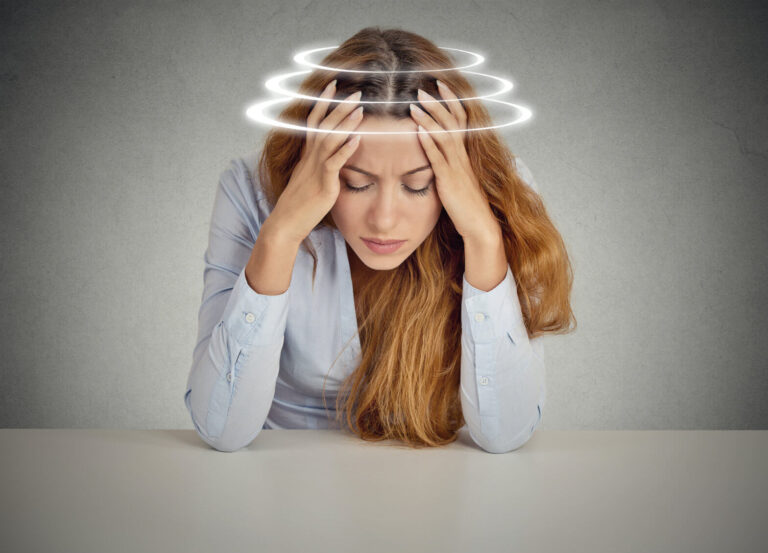Have you ever felt unsteady or had a whirling feeling in your head? Usually, this sensation is referred to as dizziness. However, the meaning stemming from the term dizziness differs from individual to individual. It’s a very common occurrence that may or may not is associated with any serious underlying health problems.
Dizziness during your period is also very common, considering the fluctuation of hormones- which are vital in preparation for bleeding if fertilization doesn’t occur during the menstrual cycle.
However, the hormonal changes in the body can affect the normal functioning of the body and hence feel dizzy-getting a whirly sensation, either in the morning or any time of the day, which makes you lose your appetite and become weak.
Signs and symptoms
- Hearing loss.
- Irregular heartbeat
- Blurred vision
Causes of dizziness during periods
The common causes associated with menstrual cycles include the following
Vertigo
For some women, they experience migraines associated with dizziness and vertigo that is stimulated by the changes in hormones during the menstrual cycle.
Vertigo is basically the sensation of motion, where there is none-feeling like you or your environment is spinning. It’s usually a sign of an underlying problem affecting the vestibular system of the inner ear-the body’s balance system.
Additionally, specific kinds of food, sleep deprivation, and stress can also trigger migraines associated with vertigo.
Hypoglycemia
Hypoglycemia is a condition that causes the body to experience low blood sugar levels. If the condition occurs during the premenstrual period it may cause dizziness, perspirations, fatigue, extreme sugar cravings and convulsions.
However, according to the Journal of Clinical Endocrinology and Metabolism,1986 there is relevant evidence to support dizziness during periods in relation to hypoglycemia.
Migraines
Experiencing a surge of migraines during your menstrual period is a very common occurrence for some women. According to the national pain foundation, it’s quite common for people affected by episodes of this neurological disorder to experience dizziness, severe headaches, nausea, tingling sensation, difficulty thinking, sensitivity to sound or light.
However, migraines causing dizziness during menstruation occurs from the age of 14 years onwards due to the production of estrogen hormone– which affects migraine activity.
Menorrhagia
This is also referred to as heavy bleeding and is very common to cause dizziness since it leads to an iron deficiency in the body and possibly anemia. Approximately 15% of women experience heavy menstrual bleeding, while for 20% of these women develop anemia- which is a decrease in the level of red blood cells.
A decreased number of red blood cells reduces the supply of oxygen to other body tissues which cause dizziness, fatigue, rapid heartbeat, lightheadedness, and irritability.
Meniere’s disease
According to a study published in the U.S Department of Health and Human Services journal, Meniere’s disease is a complicated progressive disorder affecting the inner ear. Symptoms of this disorder include vertigo, dizziness, tinnitus, and hearing loss.
Studies carried out by G.G Morse and J.W House indicate an acute relationship between menstrual cycles and the disease’s responses: and indicate that Meniere’s disease can be stimulated during a woman’s period.
Fibroids
In some cases, women who have fibroids experience heavy bleeding, which leads to anemia and dizziness as a result.
Fibroids are basically benign growths that affect the uterus, especially during a woman’s childbearing years. The National Anemia Action Council notes that about 80% of women suffer from fibroids before they reach the age of 50 years.
Low blood pressure
Also known as low pulse rate is whereby the blood pressure falls below normal hence causing a shortage of blood supply to the brain. This causes your brain to feel drained due to lack of sufficient oxygen supply hence cause lightheadedness. The fluctuations in blood pressure result in this condition.
Vitamin deficiency
Lack of adequate amounts of vitamin B12, B6, C and/or D can cause dizzy during your periods.
How to prevent dizziness
While dizziness during periods is common and isn’t a cause for concern, it can easily be prevented by taking various precautions such as:
- Avoiding sugary beverages: carbonated sugary drinks during your periods should be avoided since these drinks cause blood sugar levels to fluctuate and also worsen the PMS symptoms.
- Take some ginger tea: ginger is a good relief for calming the stomach, treating nausea and also preventing this condition. Therefore, it’s a good remedy for soothing PMS.
- If you feel dizziness coming on, take a rest, lie down for a few minutes if possible, drink some water and take deep breaths to avoid falling down.
- Ensure you eat all your meals to prevent your blood pressure from dropping- which can lead to headaches, dizziness, falling or even fainting.
- Drink at least 8 glasses of water per day especially before meals to curb the feeling of lightheadedness and dizziness.

